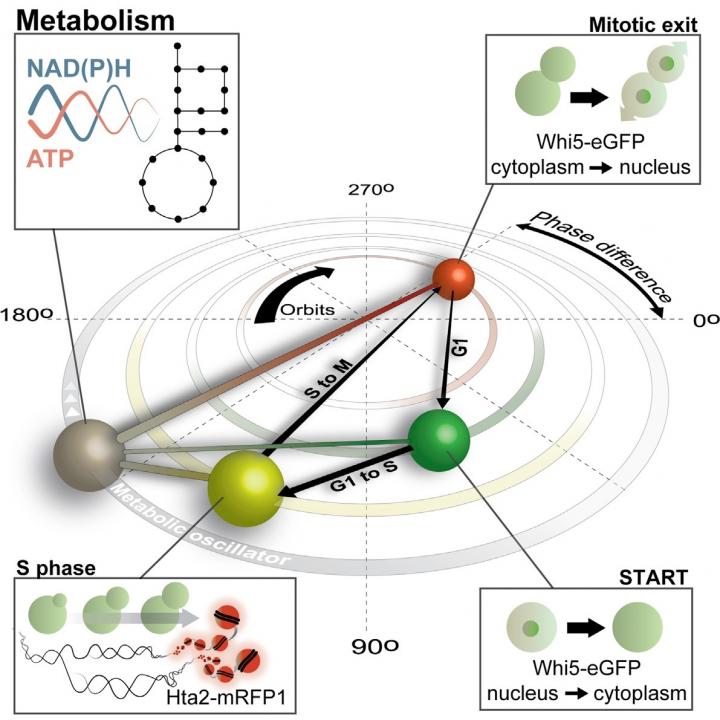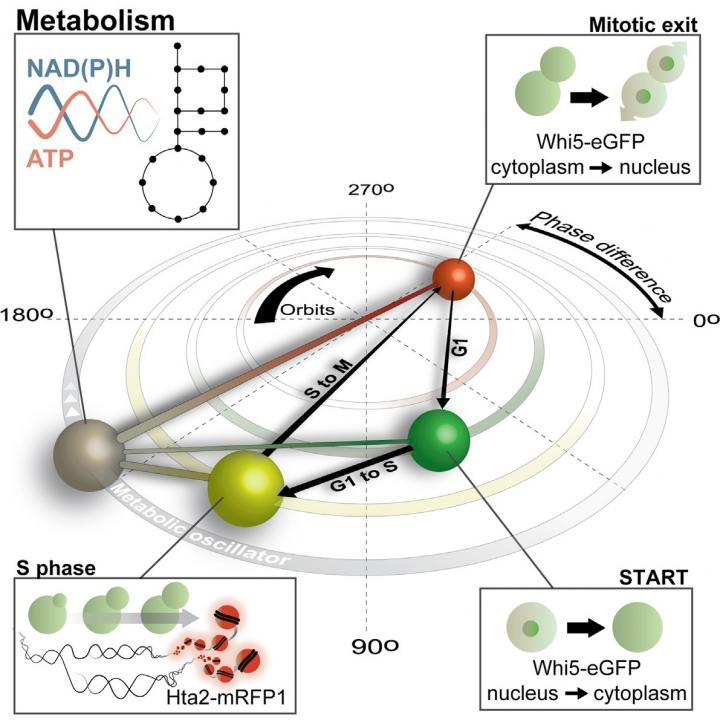
Papagiannakis et al. performed metabolite and cell-cycle measurements in single cells to show that the cell cycle is a higher-order function, which emerges from…
Credit: Molecular Cell
All textbooks describe the cyclin-dependent kinase complex as the one and only/exclusive regulator of the eukaryotic cell cycle. But now University of Groningen scientists have found evidence that a metabolic oscillator acts as the "conductor" of cell division. Their results were published online in the journal Molecular Cell on December 15.
Cells go through repetitive cycles of DNA duplication, growth, and cell division. These cycles require the careful coordination of cell-processes checkpoints that prevent cells from dividing when something – DNA duplication, for example – has gone wrong. The cyclin-dependent kinase complex was identified as the regulator of these cell cycles, and in 2001 the Nobel Prize for Physiology or Medicine was awarded for this discovery.
"But there were signs that this wasn't the complete story," says University of Groningen system biologist Matthias Heinemann. One sign was the fact that cells can divide, even when parts of the cyclin-dependent kinase complex are removed. Heinemann reasoned that metabolic oscillations might set the pace for cell division. "We knew that metabolism often oscillated in synchrony with the cell cycle. So maybe, this was an autonomous control mechanism."
Oscillator
Heinemann studied budding yeast cells cultivated in microfluidic channels. With that method, single cells could be monitored for days under the microscope. By using fluorescence techniques, it was possible to measure the concentration of two markers of metabolism: the electron carrier NADH and the energy carrier ATP. These molecules showed clear oscillatory patterns, rhythms that usually beat in synchrony with the cell cycle. Heinemann added, "But we also noticed that occasionally cells did not divide, and that these cells still showed metabolic oscillations."
So metabolism turned out to be a cell cycle-independent oscillator, which would oscillate fast if cells were well fed; poor nutrition, on the other hand, reduced the pace. "We argue that metabolism and the cyclin-dependent kinase complex are coupled oscillators, which together orchestrate the growth and division of eukaryotic cells." Or, in other words, the cyclin-dependent kinase complex is the orchestra, while the metabolic oscillations beat the rhythm, like a conductor does.
Compromise
"But when metabolism is slowed down or sped up too much, the cell cycle can't keep up and stops," says Heinemann. Both oscillations have their own natural frequency, and, under normal circumstances, these two oscillations are coupled and compromise with each other at a common frequency, which then governs the cell division process. Further experiments showed that the metabolic and the cell cycle oscillators could in fact be uncoupled.
The overall picture Heinemann and his colleagues have sketched in the Molecular Cell article is a system, in which the metabolic oscillator pulls the cyclin-dependent kinase complex through its cycle and dynamically gate the occurrence of the different cell cycle events.
New perspective
Biologists may have to change the way they view cell cycle regulation. "The current view is too narrow and cannot explain why cells still divide when part of the cyclin-dependent kinase complex is removed." A leading role played by metabolism also makes sense from an evolutionary perspective: "You would expect the earliest cells or proto-cells to have a simple control system to regulate division, and metabolism would be the obvious candidate." This new perspective could eventually be of clinical significance. "Most tumor cells have a very high metabolism. Interfering with metabolic processes could be a way to stop them from proliferating."
###
Reference: Alexandros Papagiannakis, Bastian Niebel, Ernst C. Wit, and Matthias Heinemann: "Autonomous Metabolic Oscillations Robustly Gate the Early and Late Cell Cycle." Molecular Cell, online December 15, 2016.
Media Contact
Rene Fransen
[email protected]
@univgroningen
http://www.rug.nl/corporate/index
############
Story Source: Materials provided by Scienmag





